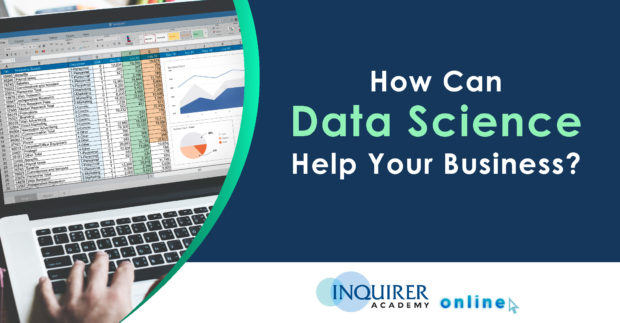How data science can help your business

We asked Aubrey Bulalacao, our subject matter expert on data science, how data science could help all companies.
Data science helps businesses create data-driven decisions
With the massive amount of data available, data science provides methodical extraction of information and analyzes data at a wide scale. It aids businesses in decision-making based on large-scale analysis, which could provide precise information. For example, a company can analyze shifts in demographic data to determine business opportunities or threats.
In 2008, hundreds of stores of a multinational coffee chain closed down, and their CEO vowed to rely more on an analytical approach to identify future store locations. They partnered with a location analytics company and used data such as traffic and demographics to pinpoint the ideal store location, and determine the likelihood of success in this location prior to investing.
Data science helps set targets and goals
It can help businesses identify the key metrics which affect their business health and performance. The biggest challenge in creating key metrics or key performance indicators is to determine the right indicator, i.e. what their target level should be and when they should set new ones. Through analysis, we could determine the true drivers of our business outcomes and use big data and machine learning to create a deeper understanding of the customer’s needs and behavior. With more reliable projections, we can create better targets that will have a better impact on companies’ growth and success.
To cite an example, an industrial sales company was having difficulty retaining customers on a business running on monthly subscription, meaning a customer could cancel at any time. The reason is that their sales representatives had adopted aggressive selling tactics offering unnecessary bundles just to sign up a customer. Through data, they found out that if customers stayed for six months, they usually stayed for a full year. So, the company redesigned the sales reps’ incentives; they were given an incentive if the subscription continues for more than six months. This changed the selling style, prospecting customers with high chance of retention, while maintaining close client relationships.
Data science helps predict business outcomes
It identifies trends and outcomes using predictive modeling. This helps businesses not only in predicting future demand, but also in anticipating risks, leading to improved company direction and improvement of processes. The biggest challenge for an e-commerce business is its inventory since trends shift rapidly and customers make decisions faster. Data science can help determine which products will be sold most, and to which customers they will sell. In an e-commerce company selling coffee products, they were able to target customers who purchased black coffee and pastry every morning through predictive modeling based on the history of customers’ shopping behavior, and this has increased their revenue.
Data science helps understand the market
To attract customers and increase profitability, it is important to create on-demand products that suit customer needs and satisfaction. Data science helps us create valuable insights from trends to produce products for the market, map out customers and strategize to sustain market relevance.
For example, a cake company spent a fortune on marketing, which achieved high visibility of its products. However, the returns did not match the expenses, since the added visibility did not turn into a sale. Through data collected on their website and social media pages, the company was able to understand not just the customer demographics, but also their behavior. This understanding goes beyond age, geographic location and gender. These data helped them create targeted marketing and offer specific products to certain groups or markets. Aside from these, they were also able to analyze consumer behavior co-occurrence, giving them details about what else such customers are likely to purchase.
It is important for businesses to make the most out of their data, and with the availability of such a large volume of data, we cannot tap their full potential if we do not understand data science. Those who are able to maximize its usage will be able to provide personalized customer experience, and maintain or grow their market share.
Bulalacao will facilitate a virtual workshop titled “Data Science in Excel: Creating Actionable Insights from Analysis and Evaluation” on Nov. 15-17. The eight-hour hands-on virtual workshop will help you conduct analysis through statistical tools and techniques, and make better decisions.
This workshop can also be customized specifically to the needs of your organization.
For more information, write to ask@inquireracademy.com, or send an SMS to these numbers 0919-3428667 and 0998-9641731.
For your other online learning needs, Inquirer Academy could assist you in designing and facilitating a virtual workshop, a webinar, or a self-paced online course for your organization.
The author is the executive director of Inquirer Academy.
